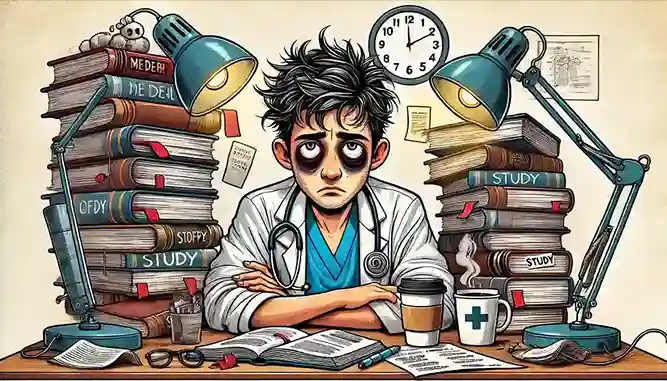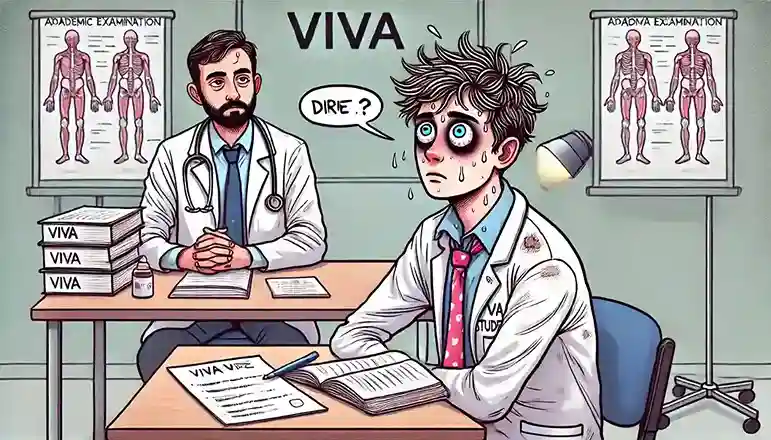Medical College and the Grind Culture: Why It’s Time to Break the Cycle
Hello future doctors!
If you’ve made it into medical school, congrats. You’ve already done what 24 lakh people aim to do. You have already won one of the toughest challenges out there. But now that you’re here, let’s talk about something we all face but rarely talk about: grind culture.
You’ve probably heard it – “Sleep is for the weak,” “Doctors are supposed to work 24/7,” or the classic “If you’re not stressed, you’re not doing enough.” Medical college, for some reason, has normalized and even glorified unhealthy work habits. And it’s about time we break that mindset.
The truth is, grinding endlessly doesn’t make you a better doctor. It only leaves you burnt out, anxious, and scared. Let’s understand why grind culture exists, why it’s dangerous, and how to build a better approach to med school.
What Is Grind Culture?
Grind culture is the belief that you need to work all day, all night, sleep 2-3 hours, and push all your limits to prove your worth. In medical school, it can be seen as:

- Skipping sleep to study just “one more chapter.”
- Feeling guilty for taking breaks or even moving from your table to eat.
- Constantly comparing your study hours to someone else’s.
- Wearing burnout like a medal and bragging about it.
The idea behind all this is that if you’re not suffering, you’re not working hard enough.
But the reality is that being overworked and exhausted doesn’t mean you’re being as productive as you can be. It just means you’re draining yourself– mentally, physically, and emotionally. And also that you are reducing your productivity by adding barriers to it.
Why Is Grind Culture So Prevalent in Medical College then?
The Pressure to Perform
From the moment you step into medical school, you’re told that you’re competing for everything – whether it’s for exam marks,PG seats, ROLs and whatnot. This pressure to perform creates a toxic cycle of overwork, where everyone feels like they need to “outdo” their batchmates to survive.

The ‘Doctor’ Stereotype
Doctors are often seen as superheroes who work tirelessly without complaining. And while medicine is a noble profession that demands dedication, this stereotype sets unrealistic expectations for students. You’re not a robot, and you don’t need to be one.
Fear of Falling Behind
Seeing your batchmates bury themselves in books or prepare for PG exams from day one can make you anxious. The fear of “falling behind” forces many students to adopt unhealthy routines, even when they don’t understand the need for it.
Why Grind Culture Is Harmful

- Burnout
Burnout is real, and it hits medical students hard. Working without breaks and sacrificing sleep might give you short-term results, but over time, it leads to exhaustion, poor concentration, and declining performance. - Declining Mental Health
Anxiety, stress, and even depression are common among medical students trapped in the grind culture. When you’re constantly chasing perfection, your mind never gets the chance to rest, and everything feels overwhelming. - Lack of Balance
Medical school is not just about books. It’s about growing as a person and a professional. If you’re spending every waking hour studying, you miss out on hobbies, friendships, and experiences that make life fulfilling. - You Learn Less
Here’s the irony, grinding all day doesn’t mean you’re learning well. When you’re sleep-deprived and stressed, your brain cannot retain information properly. Active learning and proper rest are far more productive than mindless overwork.
Breaking the Grind Culture: What You Can Do
1. Focus on Quality no Quantity
Studying for 2-3 focused hours every day is far more effective than dragging it for 12 hours. Make a routine that works for you, not against you.
- Keep up with the class pace, you do not need to complete the entire syllabus ahead of it.
- You don’t have to read every standard book out there.
- You don’t need to memorize everything, MBBS is about being smart and selective. (Do not memorize every single detail about the attachment of a muscle to a bone.)
- Not every topic is important, ask your seniors for important topics.
- Nobody can memorize everything, so don’t expect yourself to do it.
Take regular breaks. Even 10 minutes away from your desk can help you learn better.

2. Prioritize Your Mental and Physical Health
You don’t need to destroy your body and mind to prove yourself.
- Get 6–7 hours of sleep every night. No, sleep isn’t for the weak; it’s for those who want to be sane by the time they complete MBBS.
- Exercise or do something physical- walk, dance, hit the gym. You won’t realise the importance till the effects of the long hours on the desk catch up to you.
- Don’t resort to smoking or drinking no matter how much of an easy escape they are. NOT WORTH IT.
- Eat good food, try to be a little conscious of what you are putting in your body.
- If you forget something during a viva, don’t beat yourself up too much about it. You are human, you can forget things too.
3. Stop Comparing Yourself to Others
Not everyone studies the same way or has the same goals. Just because someone brings Ganong or Gray’s Anatomy to class or starts PG prep from day one doesn’t mean you have to do the same.
- Your first goal is to clear first-year MBBS and understand the basics. Don’t let anyone make you feel like you’re falling behind.
- PG prep is nothing different than studying your MBBS course material well. Don’t feel FOMO if you cannot commit to 12 hour long classes.
- Don’t feel ashamed to use mnemonics and silly acronyms to remember the course material.
- Don’t stick to the resources that people have told you about, always be on the lookout for easier alternate resources.
Maintain strict boundaries with people who make you feel anxious or constantly flex their progress. Protect your peace.

4. Make Time for Yourself
Balance is everything. You can’t pour from an empty cup. So make time for things that recharge you.
- Whether it’s music, sports, painting, or an episode on Netflix, find time for what makes you happy and calm
- Spend time with friends who understand you and value your priorities.
- Stepping away from books for a while is not “wasting time”- it’s self-care.
- YOU ARE HUMAN.
5. Remember the Big Picture
At the end of the day, why are you here? To become a doctor who can help patients, save lives, and make a difference.
One bad exam, one skipped lecture, or one overwhelming day doesn’t define you. You’re not here to prove how much stress you can handle. You’re here to learn and grow.

When you feel anxious because you do not remember one small thing, remember that all of us started somewhere. The strict professor that terrorizes you today, also was a first year student who struggled with bone attachments.
The PG topper that is on every news channel, failed in first year MBBS. The Heads of your departments also had difficulty remembering drugs in second year pharma.
Everybody pretends to be tough and untiring, but everybody was scared when they started.
The difference you can make is by not giving in to the stress like some people did. Maintain your boundaries and stick to a work schedule that helps you get through med school but does not take a long term toll on your body and mind.
After all, your health is all you really have.
Final Words
Success in medical college isn’t about being the most stressed-out or overworked student. It’s about being consistent and balanced.

Let’s break the toxic loop of grind culture. You don’t need to sacrifice your mental health or happiness to prove your worth. Try to get through this crazy journey without losing yourself.
Take breaks, be kind to yourself, and focus on the journey, not just the finish line. Because the best doctors aren’t the ones who burned out in medical school; they’re the ones who found balance.






